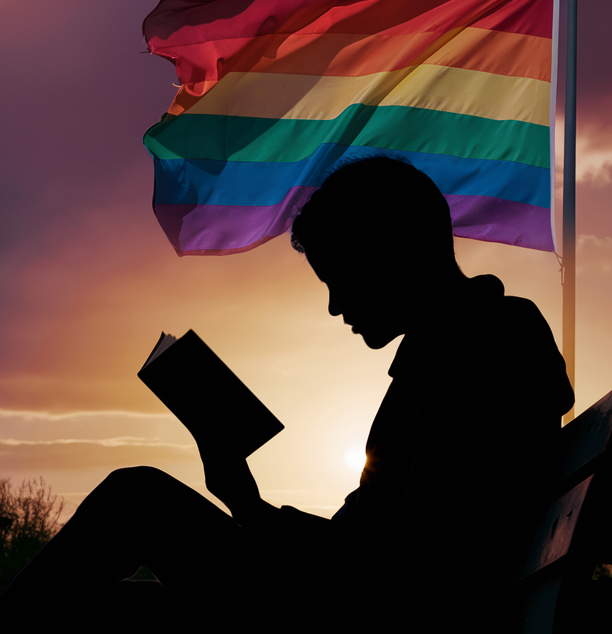This June, we have a few book recommendations to celebrate Pride: skip the corporate rainbow-washing and instead curl up with a good book by a queer* author featuring queer themes, characters, and insights. The following books, encompassing just some of the diversity of LGBTQ community, delve into the joys, sorrows, and full range of queer life—and they’re plain good reads!

NONFICTION
Authors tell it like it is in these works of nonfiction that describe various aspects of the queer community.
Queer: A Graphic History by Meg-John Barker and Jules Scheele
This illustrated book is a welcoming and in-depth look into the history of queer theory, thought, and action. Meg-John Barker, with the help of Jules Scheele’s drawings, explains piece by piece the nuances of the LGBTQ community, celebrating the differences of and within the community, as there is no one-size-fits-all description or theory to encapsulate the whole. This makes the book accessible for all readers, from those out and proud to allies who are still learning about the identities and language within the queer community.
Song in a Weary Throat: Memoir of an American Pilgrimage by Pauli Murray
Pauli Murray, a Black revolutionary during the civil rights movement, grew up in Durham, NC, and having been born in 1910, did not grow up during a time when being queer was at all acceptable—it was outright illegal. This memoir focuses on their (Murray’s self-described pronouns and gender expression shifted over their lifetime and the pronouns used today for Murray vary) work as a feminist in the rebellion against segregation.
How We Fight for Our Lives by Saeed Jones
“I made myself a promise: Even if it meant becoming a stranger to my loved ones, even if it meant keeping secrets, I would have a life of my own.” Saeed Jones’ coming-of-age memoir beautifully, hauntingly, powerfully, illustrates the complicated intersectionality of being a Black gay man from the South. Deeply personal and vulnerable, Jones writes about relationships and navigating life as he lived it.
Let the Record Show: A Political History of ACT UP New York, 1987-1993 by Sarah Schulman
The AIDS crisis and resultant political movement in the 80s and 90s was a time of intense loss and devastation in the queer communities across the United States. ACT UP arose out of this crisis as a “diverse, non-partisan group of individuals united in anger and committed to direct action to end the AIDS crisis” (ACT UP Historical Archive). People came from all sides of the political spectrum, across races, genders, and sexualities, to fight for recognition of the AIDS crisis as well as funding and research to end its catastrophic siege of the LGBTQ community and beyond. Through interviews with members of ACT UP New York, Sarah Schulman crafts a nuanced, intense, dynamic timeline of the movement in the late 80s and early 90s.
NOVELS
There are many works of realistic fiction by queer authors, and sci-fi and fantasy allow exploration of queer themes in unique ways. Here are just a few:
Nimona by ND Stevenson
This graphic novel is funny, engaging, and has an enemies-to-lovers romance. What more could you want? Oh, there are also knights, shapeshifting, a loveable protagonist(s?), a blurring between heroism and villainy, complex characters, and amazing illustrations. ND Stevenson expertly crafts a story that explores the human need to be understood, as everyone has a past that has shaped them and a desire to come into their own. It’s also now a wonderful film that’s out on Netflix.
This Is How You Lose the Time War by Amal El-Mohtar and Max Gladstone
This epistolary sci-fi novella packs a punch, following two rivals on either side of a complicated time war. With beautiful prose and intense imagery, we follow the narrators’ journeys as they go from leaving taunting messages for the other to slowly realizing the companionship and similarities between them, even as time, space, and the seemingly unending war keep them at odds.
My Volcano by John Elizabeth Stintzi
Following the story lines of several different characters, Earth is faced with a volcano that suddenly (and (sometimes) catastrophically) rises out of Central Park, NY, NY. John Elizabeth Stinzi has written a truly genre-bending narrative that crosses fantasy, sci-fi, and literary fiction to include time travel, alternate realities, hallucinations, and monstrous beings. As the world changes, we see its transformation from the eyes of a Mexican child, a White trans American, a Nigerian in Tokyo, a nomadic Mongolian farmer, among others, in this intricate and intense book.
A Psalm for the Wild-Built by Becky Chambers (and its sequel A Prayer for the Crown-Shy)
Dex has always had a nagging feeling that there’s something more for them out there, some unknown answer, and they aim to find it. Without really intending to, but also not not intending to, Dex finds themselves in the Wild and stumbles upon a robot: no one has seen a robot since they became sentient and left the cities for the Wild to live free and peacefully without human interference. This solarpunk novella is a cozy read that contemplates human (and nonhuman) connection while exploring themes of rewilding, purpose, and what it means to be human.
POETRY
You may be familiar with the works of Adrienne Rich, Audre Lorde, Mary Oliver, and even the Greek poet Sappho, to name a few: queer poets who have shaped the world of poetry. Here are a few recommendations that are invaluable to the cultural anthology of queer writing, adding their own verses to the tapestry that is the LGBTQ experience. Honestly, these poets speak for themselves:
When I Grow Up I Want to Be a List of Further Possibilities by Chen Chen
“On Earth lately, I’ve been looking at everyone
like I love them, & maybe I do. Or maybe I only love
one person, & I’m beaming from it. Or actually
I just love myself, & I want people to know.”
from “Elegy”
“How we fell in love during jumps
on his tragic uncle’s trampoline. We fell in love in midair.”
from “Summer Was Forever”
Time is a Mother by Ocean Vong
“In my language, the one I recall now only by closing my
eyes, the word for love is Yêu.
And the word for weakness is Yếu.
How you say what you mean changes what you say.
Some call this prayer, I call it watch your mouth.”
Don’t Call Us Dead by Danez Smith
“paradise is a world where everything
is sanctuary & nothing is a gun.”
…
“i was his secret until i wasn’t
alive until not. outside our closet
i found a garden. he would love it
here. he could love me here.”
from “summer, somewhere”
Black Girl, Call Home by Jasmine Mans
“are women labeled
crazy when you feel
like their rage
outweighs the evidence
of their pain?”
from “Crazy”
“I don’t want you in that kind of pain,
this world ain’t sweet on those kinds of women,
I don’t want another reason to be scared for you.
from “Momma Said D*ke at the Kitchen Table”
*“Queer” is used as an umbrella term used throughout this post to describe members of the LGBTQ community; some of the authors and characters may not have described themselves as queer but are labeled as such to be inclusive of their gender identity and/or sexual orientation, especially when faced with historical unknowns or ambiguity.
The author of this blog post, Anali North Martin (she/her), would like to add the disclaimer that she is a white queer bisexual ciswoman, living and working on traditional Lumbee, Shakori, Cheraw, Eno, Occaneechi, Skaruhreh/Tuscarora, and Saponi land.
By: Anali North Martin
Anali is a Senior Editor at Technica Editorial



